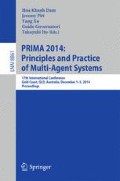Abstract
Online social networks can be viewed as multi-agent systems (MASs) built on top of social relationships. In these environments, relationships among agents are often formed through trust. Accurately estimating the degree of trust between agents is important in this case as social relationships are frequently leveraged to recommend products or services. Existing social trust models often utilize rating similarity between different agents to calculate how much they should trust each other. However, when a new truster enters the MAS and has not provided sufficient number of ratings, existing approaches cannot effectively advise the truster on which other agents can be trusted. To address this problem, we propose a social trust model that considers a trustee agent’s influence in a social network. Evaluation based on the Epinions dataset shows that the proposed model significantly outperforms a state-of-the-art approach in social recommendation.
Access this chapter
Tax calculation will be finalised at checkout
Purchases are for personal use only
Preview
Unable to display preview. Download preview PDF.
References
Au Yeung, C.M., Iwata, T.: Strength of social influence in trust networks in product review sites. In: WSDM 2011, pp. 495–504 (2011)
Borzymek, P., Sydow, M., Wierzbicki, A.: Enriching Trust Prediction Model in Social Network with User Rating Similarity. In: CASoN, pp. 40–47 (2009)
Hang, C.-W., Wang, Y., Singh, M.P.: Operators for propagating trust and their evaluation in social networks. In: AAMAS, pp. 1025–1032 (2009)
Jamali, M., Ester, M.: Trustwalker: a random walk model for combining trust-based and item-based recommendation. In: KDD, pp. 397–406 (2009)
Jamali, M., Ester, M., Ester, M.: A matrix factorization technique with trust propagation for recommendation in social networks. In: RecSys, pp. 135–142 (2010)
Kim, Y.A., Phalak, R.: A trust prediction framework in rating-based experience sharing social networks without a web of trust. Inf. Sci. 191, 128–145 (2012)
Koren, Y.: Factorization meets the neighborhood: a multifaceted collaborative filtering model. In: KDD, pp. 426–434 (2008)
Ma, H., King, I., Lyu, M.R., Lyu, M.R.: Learning to recommend with social trust ensemble. In: SIGIR, pp. 203–210 (2009)
Ma, H., Zhou, D., Liu, C., Lyu, M.R., King, I.: Recommender systems with social regularization. In: WSDM, pp. 287–296 (2011)
Matsuo, Y., Yamamoto, H.: Community gravity: measuring bidirectional effects by trust and rating on online social networks. In: WWW, pp. 751–760 (2009)
Mui, L., Mohtashemi, M., Halberstadt, A.: A computational model of trust and reputation, pp. 188–196 (2002)
Salakhutdinov, R., Mnih, A.: Probabilistic matrix factorization. In: NIPS, pp. 1257–1264 (2008)
Tang, J., Gao, H., Hu, X., Liu, H.: Exploiting homophily effect for trust prediction. In: WSDM (2013)
Tang, J., Gao, H., Liu, H.: mTrust: discerning multi-faceted trust in a connected world. In: WSDM, pp. 93–102 (2012)
Yang, X., Steck, H., Liu, Y.: Circle-based recommendation in online social networks. In: KDD, pp. 1267–1275 (2012)
Author information
Authors and Affiliations
Editor information
Editors and Affiliations
Rights and permissions
Copyright information
© 2014 Springer International Publishing Switzerland
About this paper
Cite this paper
Mei, JP., Yu, H., Liu, Y., Shen, Z., Miao, C. (2014). A Social Trust Model Considering Trustees’ Influence. In: Dam, H.K., Pitt, J., Xu, Y., Governatori, G., Ito, T. (eds) PRIMA 2014: Principles and Practice of Multi-Agent Systems. PRIMA 2014. Lecture Notes in Computer Science(), vol 8861. Springer, Cham. https://doi.org/10.1007/978-3-319-13191-7_29
Download citation
DOI: https://doi.org/10.1007/978-3-319-13191-7_29
Publisher Name: Springer, Cham
Print ISBN: 978-3-319-13190-0
Online ISBN: 978-3-319-13191-7
eBook Packages: Computer ScienceComputer Science (R0)

